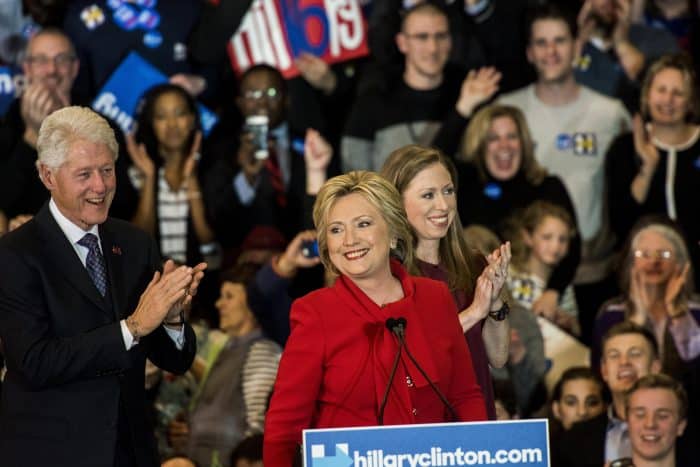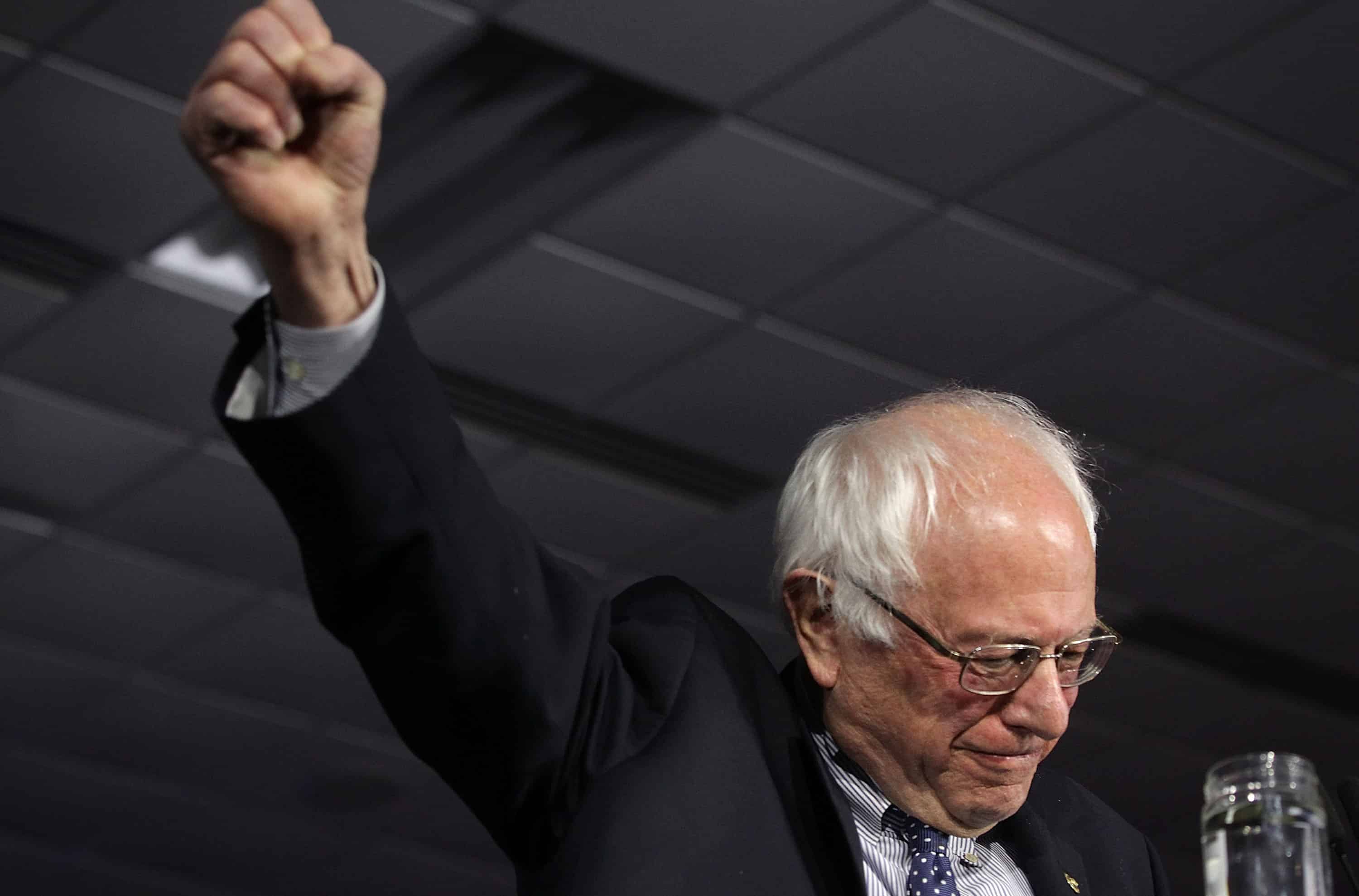DES MOINES, Iowa – Hillary Clinton and her late-surging rival, Sen. Bernie Sanders, remained locked in a dead heat with most precincts reporting in Iowa’s Democratic caucuses late Monday, setting up what is likely to become a prolonged nominating contest.
Clinton and Sanders effectively battled to a draw in the Iowa caucuses, splitting the vote in the first U.S. presidential selection contest of 2016. The outcome, stunning after Clinton’s onetime dominance over a challenger who entered the race a virtual unknown, means the two Democrats are likely to claim roughly the same number of delegates so far.
Even if Clinton prevails, the close contest in Iowa confirms that Sanders’s anti-establishment message has real muscle and appeal. While a narrow victory for the former secretary of state would make good on nearly a year of dutiful campaigning and heavy investment in Iowa, it would also leave residual doubts about her weaknesses among Democratic voters.
Sanders leads Clinton in New Hampshire, which votes in seven days, and has money and national support to continue to challenge her for weeks or months beyond that. Clinton remains the favorite to win the Democratic nomination this summer, but a pair of losses to begin the primary season would be likely to leave her hobbled.
Clinton took the stage at her election-night party late Monday without immediately claiming victory. Instead, she acknowledged how unresolved her battle with Sanders is.
“It is rare that we have the opportunity,” Clinton said, “to have a real contest of ideas, to really think hard about what the Democratic Party stands for, and what we want the future of our country to look like.”
Later in her remarks, Clinton said: “I stand here tonight breathing a big sigh of relief. Thank you, Iowa.”

Sanders took the stage at his own party a short time later, and he declared the contest a draw. “Tonight, while the results are still not known, it looks like we are in a virtual tie,” he said. “It looks like we’ll have about half of the Iowa delegates.”
Just after midnight, with 95 percent of precincts reporting, Clinton logged 49.8 percent support, and Sanders showed 49.6 percent. Martin O’Malley, the former Maryland governor who suspended his campaign after his dismal showing in Iowa, registered just 0.6 percent – although that number reflected the fact that, in most precincts, his supporters were given the choice to caucus with another candidate after he registered less than 15 percent. It is unclear what will happen to the eight delegates O’Malley did win, which could sway the contest between Clinton and Sanders.
In the ballroom where Sanders supporters had gathered, those numbers were interpreted as an overwhelming victory.
“This is like the Phoenix rising,” said RoseAnn DeMoro, executive director of National Nurses United, the first major labor union to back Sanders. “No matter what the outcome is, we’ve won. The movement is going to be on steroids now.”
DeMoro predicted a major boost of momentum for Sanders heading into New Hampshire and subsequent states, regardless of which candidate eked out the victory.
The former secretary of state, senator from New York and first lady began her campaign in Iowa 40 points ahead of Sanders, an independent senator from Vermont and self-described democratic socialist who was initially considered little more than a gadfly. Clinton’s erosion of support sowed doubts about her policy-driven candidacy in a year of populist insurgency and outsider candidates.
The former secretary of state’s answer, delivered with increasing urgency in the closing weeks here, was that she has more practical and realistic proposals than Sanders and that she would be the better choice for Democrats to defeat a Republican candidate in the fall.
“I think I have the record, the experience, the know-how to get it done,” she said in an interview Monday on NBC’s “Today” show.
Her campaign manager, Robby Mook, said in an interview Monday that the close race “tested us. It’s made us better at what we do.”
Clinton’s allies also like to say that nothing is more revolutionary than the first female president.
Sanders’s extraordinary come-from-way-behind campaign here captured a current of liberal anger at the status quo and rocked Clinton’s by-the-book attempt to redeem her crippling loss in Iowa eight years ago.
“I love everything he stands for,” said Cali Wilson, 25, a recent University of Iowa graduate who lives in Mount Pleasant and was wearing a baby-blue “Bernie for President” T-shirt when the candidate came to town.
In particular, Wilson cited “his emphasis on the younger generation,” including his promise to end corporate welfare.
Heading into the caucus vote, most polls showed Clinton and Sanders within two or three percentage points of each other. Although most polls showed Clinton with a slight edge, the findings were within the margin of error.
Turnout appeared high by caucus standards, with long lines to enter schools, firehouses and other voting places. The Iowa Democratic Party said numbers were not expected to reach the historic statewide high of 240,000 in 2008, when Barack Obama delivered a stunning defeat to Clinton here.
Network exit polling showed Democratic voters divided sharply along generational and ideological lines. Sanders was fueled by an overwhelming lead among younger and strongly liberal voters, while Clinton was buoyed by broad support from moderates and those older than 50.
Clinton’s campaign said from the start that it anticipated a competitive primary. History suggested that it was right, even if Clinton’s fortress-like dominance of the race early on suggested otherwise.
A passionate electorate
Bernie Sanders, 74, tapped into the electorate’s economic anxiety with a call for a “political revolution” aimed at curbing the outsize influence of the “billionaire class” and leveling the playing field for ordinary Americans.
His vision of a country with universal health care and free college tuition was dismissed by his critics – including Clinton and her allies – as unworkable. But the ideas resonated with large swaths of voters who were disillusioned with the political process and wary of Clinton.
Over the summer, Sanders saw his crowds at rallies around the country swell into the thousands, with supporters turning out for festival-like events with homemade “Feel the Bern” signs. At the rallies, Sanders typically spoke for an hour or more.
“You want a radical idea? All right, here’s a radical idea,” the rumpled, white-haired senator shouted at his audience at his final campaign rally Sunday night in Des Moines. “Together, we’re going to create an economy that works for all of us, not just the 1 percent.”
Although Clinton has fervent supporters, boasts the magic of her last name and carries the history-making potential to become the first female president, she has run a one-foot-in-front-of-the-other campaign in Iowa that prized mechanics over majesty. She has struggled to inspire the Democratic electorate and expand her rationale for running much beyond her own lengthy résumé.
And despite her record-setting popularity as secretary of state, Clinton has spent a good part of her time trying to get past, or explain away, her decision to use a private email system whose security the FBI is now examining.
“I don’t think she’s a saint,” said Cindy Roeser, 55, a new Iowa resident and first-time caucus-goer who supported Clinton. “She’s had to make some very difficult choices when there was no easy, good choice to make, but she’s always made the best choice. She’s committed to her causes and people say it’s in her self-interest, but I think she’s done what she had to do to promote the things she believes in.”
Sanders faces considerable obstacles once the nominating contest moves beyond New Hampshire.
Despite a long history of civil rights activism, Sanders acknowledged early on that he faces a challenge connecting with Latino and black voters, who will be crucial to the outcome of upcoming contests in Nevada and South Carolina.
Clinton has enjoyed widespread backing from Democratic elected officials, who will play a formal role in the nominating process as superdelegates. As of Monday, Sanders had been endorsed by only two members of Congress and by none of his fellow senators.
Despite vows to get money out of politics, Sanders’s campaign has not suffered from a lack of resources. In the two most recent fundraising quarters, he nearly matched Clinton’s haul. And on Sunday, Sanders’s campaign announced it had taken in an eye-popping $20 million in January alone.
His take, fueled by hundreds of thousands of small online donations averaging $27 apiece, enabled Sanders to put on a robust television advertising campaign in Iowa that matched, if not exceeded, Clinton’s in the closing weeks.
Aides said they expect a new wave of donations regardless of the outcome Monday.
An uptick in attacks
For much of the race, Sanders avoided direct criticism of Clinton. That changed in the fall, when he began to more aggressively draw contrasts with the former secretary of state on issues including Wall Street reform, expansion of Social Security and her late opposition of a pending trade deal that he had vociferously spoken out against much earlier.
In the closing weeks of the contest, both camps stepped up their attacks. Sanders pointedly questioned whether Clinton’s acceptance of campaign contributions and speaking fees from Goldman Sachs and others in the financial sector undermined her ability to push for the Wall Street reforms he said were needed to avoid another meltdown similar to 2008.
Republican opponents and their allies are sure to cast a loss, or even a near-loss, for Clinton in Iowa as evidence that the presumptive Democratic favorite has feet of clay.
The lingering questions surrounding Clinton’s State Department email have added grist to that argument and have contributed to voter unease about her trustworthiness. Even when she was polling much better in Iowa, pollsters found distrust and dislike for Clinton among many of the same voters who said they found her qualified.
The State Department said Friday that 22 emails that passed through Clinton’s unorthodox private email server contained “top secret” information. The messages were not marked as such at the time, and her campaign took the unusual step of accusing intelligence agencies of retroactive “overclassification run amok.”
Clinton has said she regrets her decision to exclusively use the separate communication system for her government work but maintains that she did nothing wrong. The Justice Department is probing whether secrets were compromised, an open question that hangs over Clinton as the primary voting begins.
Clinton, 67, had a lift over the weekend from a laudatory New York Times endorsement, atop those of the Des Moines Register and several smaller Iowa newspapers.
The Register editorial, which came out slightly more than a week ahead of the caucus vote, said “no other candidate can match the depth or breadth of her knowledge and experience.”
“The presidency is not an entry-level position. Whoever is sworn into office next January must demonstrate not only a deep understanding of the issues facing America, but also possess the diplomatic skills that enable presidents to forge alliances to get things done,” the newspaper wrote.
© 2016, The Washington Post









